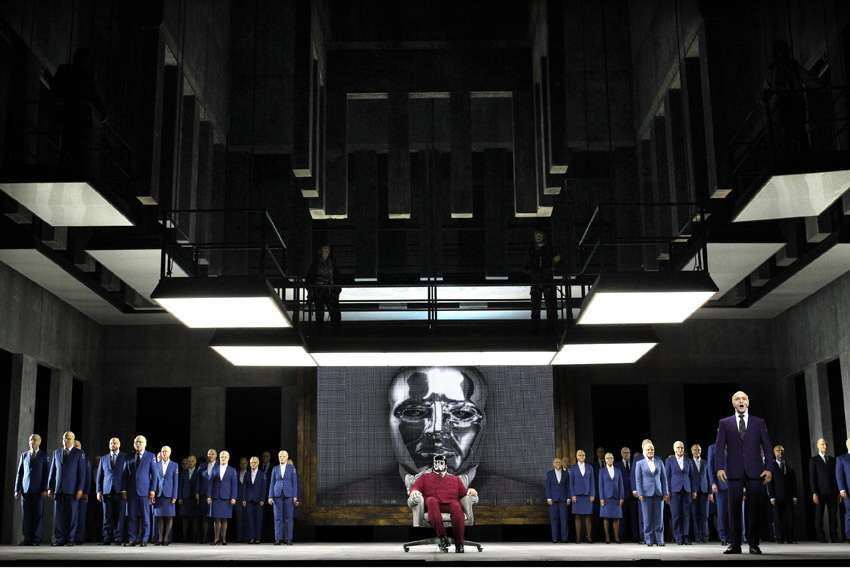|
Back
Dark, disguised and dangerous Melbourne
State Theatre
04/12/2013 - & April 17*, 20, 23, 26, May 3, 2013
Giuseppe Verdi: Un ballo in maschera
Diego Torre (Gustav III), Csilla Boross (Amelia), José Carbó (René, Count Ankarström), Mariana Pentcheva (Ulrica Arfvidsson), Lorina Gore (Oscar), Christopher Hiller (Christian), Richard Anderson (Count Ribbing), David Parkin (Count Horn), Andrew Brunsdon (Judge),
Dean Bassett (Servant)
Orchestra Victoria, Opera Australia Chorus, Michael Black (Chorus Master), Andrea Molino (Conductor)
Alex Ollé (Director), Alfons Flores (Set Designer), Lluc Castells (Costume Designer), Urs Schönenbaum (Lighting Designer)

(© Jeff Busby/Opera Australia)
Opera Australia in partnership with Teatro Colón, Buenos Aires; La Monnaie, Brussels; the Norwegian National Opera & Ballet, Oslo; Teatro Communale, Bologna and Catalonian company La Fura dels Baus, presents a dramatic and darkly threatening production of A Masked Ball.
In a world somewhere between The Matrix and Orwell’s 1984, the privileged and powerful ruthlessly guard their positions in society, hatching and fomenting their plots. Director Alex Ollé evokes Big Brother, explicitly including references electronic and human to violence, subjugation and intimidation. Outsiders bear down ever more urgently at the edges of this frightening futuristic world. Their efforts to overthrow the might of the state are feeble in comparison to the power of the elite and are met with a unified and violent front by the suitably robotic lackeys who attend the King.
This performance was an evening of superb music-making and intriguing interpretation. The visual presentation was entirely engaging and the singing and playing from both local and international artists was very strong.
Italian conductor Andrea Molino read an abundance of light and shade into the score. He pressured it forward, at times driving a furious pace and at others lingering over the emotional complexities of torment, love and betrayal. Orchestra Victoria produced gloriously rich and dark sounds which Molino contrasted with the flamboyance of the page Oscar played not as a trouser role but as an ultra-efficient female P.A. by Australian soprano Lorina Gore. The character is a flirt and extrovert who knows her position with the King well enough to fall into his lap proffering her opinions about Ulrica. Ms. Gore has a dazzling voice with precise upper register and razor sharp diction.
Interpreting Gustavo III Mexican tenor Diego Torre gave us a king who was part playboy, part megalomaniac and all dangerous for his changes on a whim. His voice was restrained at times, seeming to allow the orchestra to carry the music; then at others, he added contrast and force to his role particularly in the fortune-telling scene.
Hungarian soprano Csilla Boross as Amelia was an ample match for Torre. In the duets their voices proved an inspired combination. Ms. Boross explored the full range of her voice producing gorgeously rich lower tones and assured, confident upper register of immense power. She did not convince us that Amelia was a naďve innocent, tempted by the king’s attentions but she evoked a strong sense of torn emotions and divided loyalty.
Australian baritone José Carbó was a standout performer in this production. His smooth, rich voice gave us the full range of Count Ankarström’s character. Trusted best friend to the king, husband to Amelia; unswerving loyalist and unflinching murderer, Mar. Carbó ran a gamut of emotions which peaked at the start of the third act when in his anger at Amelia’s betrayal, he realises what he has lost. This was a moving and entirely convincing portrait.
Ulrica, the reviled fortune-teller was performed by Bulgarian mezzo Mariana Pentcheva. The role requires the range of a contralto and Mos. Pentcheva’s voice seemed at first to lack power in the lower register. The latter part of her performance in the second scene however benefited from the full extent of her vibrato bringing an authority and ferocity to the role.
Subsidiary characters Counts Ribbing and Horn sung by Richard Anderson and David Parkin were delivered with calculated discontent and malice.
In this startling and divisive production, emphasis is given to the threatening: the undercurrent of Verdi’s sonorous score, the pressure of the gathering masses outside the palace walls and the oppressive, austere set. Designers have given full range to their imaginations to produce a set which combines a severe institution, a concrete prison block and a labyrinthine forest of posts. In the darkened depths of the set, torch bearers move ever closer in both the second act and the final scene of the opera.
Above the concrete, raised or lowered into prominence, elevators dominate the upper space. Protesters scrutinize, graffiti “No Future” or drape banners inscribed with “No Masks” or “Resist”. We feel the pressure of outside forces on this rarefied life of privilege and control of the totalitarian state over which Gustavo III rules.
The forces of state power, each inscribed with a number which may be inmate-identification or perhaps a robotic model number, exert their authority with violence and menace. Three or four colours of uniform suits hint at social strata and only the King is without an identification mark. All characters wear head coverings and masks reminiscent as much of sports protective wear as of Spartan war masks. Only the King is differentiated in silver and it is the representation of his mask which is projected over the whole set and onto the front curtain.
Audience reaction to these masks varied: perhaps they obscured facial expressions (certainly they are removed in some ‘private’ moments to enable full range to the emotions); perhaps they indicate the segregation of society into those in power and those seeking it. The reasoning is unclear but the masks caused much comment at the performance I experienced.
A brilliant night of theatre and music.
Opera Australia, Melbourne
Gregory Pritchard
|